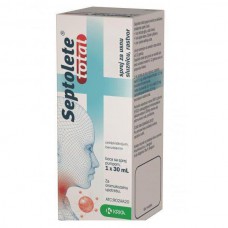Expiration date: 04/2026
The benzydamine hydrochloride is a NSAID and painkiller. It is believed that the mechanism of action associated with the inhibition of prostaglandin synthesis and, consequently, with a decrease in the severity of inflammation (such as pain, hyperemia, swelling, fever). Of benzydamine hydrochloride also provides a modest local anesthetic action.
Cetylpyridinium chloride-antiseptic group Quaternary ammonium compounds. It acts as a cationic detergent. Quaternary ammonium compounds bind to the surface of bacterial cells, penetrate through it and bind to the cytoplasmic membrane of the microorganism. As a result of binding, the cytoplasmic membrane of microorganisms increases the permeability to low molecular weight ingredients, mainly potassium ions. Then Quaternary ammonium compounds penetrate the cell, disrupting cell function and thus destroying it.
Cetylpyridinium chloride has a wide range of antimicrobial action, as well as antifungal activity (for example against Candida and Saccharomyces) and antiviral activity against some viruses with the shell. The most pronounced is the bactericidal effect on gram-positive bacteria (in particular on Staphylococcus). Gram-negative bacteria are moderately sensitive to cetylpyridinium chloride, while some strains of Pseudomonas are relatively insensitive.


